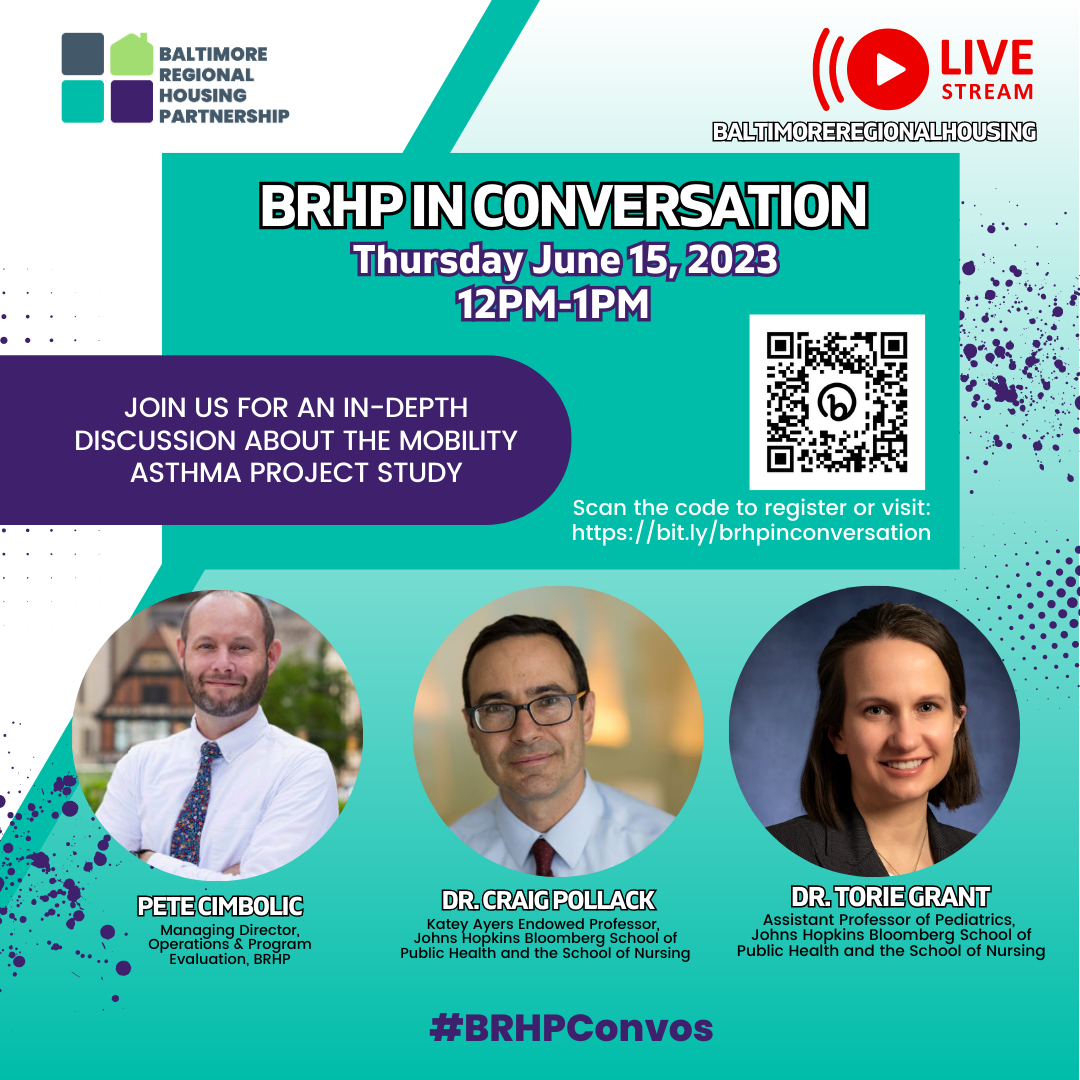
Steven Chen, Communications Intern
On June 15, 2023, the Baltimore Regional Housing Partnership had the pleasure of hosting Johns Hopkins researchers Dr. Craig Pollack and Dr. Torie Grant alongside BRHP’s own Pete Cimbolic in our most recent BRHP In Conversation event. Craig Pollack, M.D., M.H.S. is a researcher at the Johns Hopkins Medical Institute and leader of the Mobility Asthma Project study. Torie Grant, M.D., M.H.S. is Associate Professor of Pediatrics at Johns Hopkins School of Medicine.
The Mobility Asthma Project study, recently published in the Journal of the American Medical Association, investigates the relationship between housing mobility and asthma morbidity. It observed that children currently living in high poverty, under-resourced neighborhoods tend to experience higher rates of asthma symptoms, as well as more extreme outbreaks when symptoms do occur, compared to those in lower-poverty neighborhoods. Working in conjunction with the Baltimore Regional Housing Partnership, the study’s authors conducted air and vacuum tests, as well as allergy and asthma research, at 0-, 3-, 6-, and 12-month intervals after study participants conducted moves to lower-poverty neighborhoods in Baltimore and its surrounding counties. Dr. Pollack reported that the study observed a more than 50 percent decrease in instances of asthma exacerbation in study participants and drew a key link to lower levels of stress reported by caregivers, which accounted for approximately 1/3 of the decrease. Importantly, this stress decrease was seen in family units, with parents’ lowered stress levels affecting their children as well. Thus, there are greater health implications that may extend to this research as well.
The study’s importance was reinforced by Dr. Torie Grant, who described the biological and social impacts of asthma and its symptoms. Asthma can cause difficulty breathing, chest pain, and difficulty performing physical activity, and is generally controlled with inhaler drugs when symptoms occur. However, these symptoms can cause significant difficulty in patients’ everyday lives – asthma can cause people to wake up at night with feelings of choking, prevent them from performing physical activities, and interfere with education or work. Thus, the more than 50% observed reduction in asthma symptoms amongst study participants has a significant impact on the lives and well-being of children who move to lower-poverty areas. Dr. Grant further described the importance of pre-teen and teenage lung development, linking it to overall health into adulthood and describing how positive changes to asthma outcomes in turn promote healthy lung growth and long-term respiratory health.
Pete Cimbolic discussed the human implications of the study and BRHP’s cooperation with the research team in the context of furthering ethical research practices. Historically, research involving underprivileged and Black communities generally involved putting participants, willing or otherwise, under intensive, often exploitative, scrutiny. These participants and communities rarely benefited from the results of research and were generally not compensated for their time and involvement. The Mobility Asthma Project study, in contrast, saw participants who opted into the study compensated for their time and able to benefit from the fruits of the research in which they participated.
Pete Cimbolic also emphasized the impact of the study on the field of housing mobility. While housing mobility programs have demonstrated important benefits to participant well-being and health, formal studies like the Mobility Asthma Project study help build a body of research that serves to quantify and prove the effectiveness of housing mobility programs like the one administered by BRHP. Dr. Pollack also noted that increasing numbers of interdisciplinary studies that combine healthcare and other social factors, such as housing, have led to an increased understanding of social determinants of human health. These studies represent an important addition to the body of research around housing mobility programs and their effectiveness and may help health partners and legislative bodies alike recognize the importance of housing to overall health.
Despite the study’s impact, the panel also emphasized the need for further action, both in research and in support for housing mobility. Dr. Pollack encouraged partnerships between the research community and social organizations like BRHP, enhancing researchers’ abilities to target and solve issues from perspectives that may not have yet been investigated. Pete, in turn, hopes to see the expansion of funding for programs like BRHP’s, especially with studies to quantify and present the positive impact housing mobility programs have shown.
Interested in learning more? Watch the full conversation at BRHP In Conversation.
Read the Mobility Asthma Project study at https://jamanetwork.com/journals/jama/article-abstract/2804823.